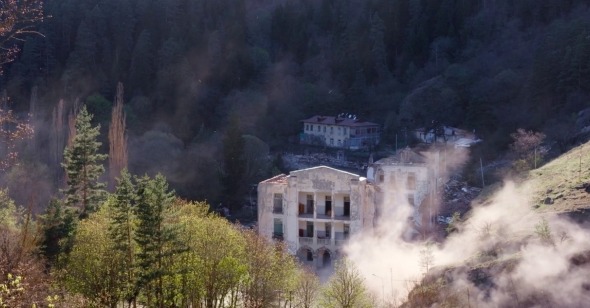The Fallen
By Chris Shields
Magic Mountain
Dir. Mariam Chachia and Nik Voigt, Georgia/Poland, no distributor
Magic Mountain screened Thursday, March 14, at Museum of the Moving Image as part of First Look 2024.
Mariam Chachia and Nik Voigt’s poetic documentary Magic Mountain opens with footage shot through the windshield of a moving vehicle. The road it travels is winding and narrow, and the fading white buildings lining it communicate both eastern bloc functionality and peasant charm. The shot is held long enough to recalibrate the viewer’s expectations of pace, and soon, what might have been simply a unit of narrative information (a shot) becomes an opportunity for presence, to reflect in quietude. At the point when a voice speaks in an intimate whisper directly to the viewer, time has ceased to matter, or more aptly, it has transformed. Like Thomas Mann’s 1924 novel from which it borrows its title, Chachia and Voigt’s film is about a place with purported curative qualities for tuberculosis sufferers. Whereas Mann’s towering novel, a timely meditation on the political and cultural environment in Europe leading up to the first world war, lives largely in its characters, Chachia and Voigt’s film, instead, personifies the “magic mountain” itself to unique and ghostly effect.
For seven years, Chachia, who recovered from tuberculosis, has been plagued by dreams of Abastumani, a mountain in Georgia that is home to Abastumani Tuberculosis Sanatorium. The mountain retreat, originally built for the Russian monarchy, is now a decaying relic of the bygone Soviet era. Its halls are filled with patients smoking, watching television, playing backgammon, and gambling as masked doctors and nurses attempt to administer treatment and maintain order with gentle paternalism. The patients, outcasts from society, appear half alive as they are given shots, pills, and IV drips, and it’s difficult for the viewer to imagine anyone successfully recovering in, let alone leaving, these dim halls. In this way, Magic Mountain shares the insularity of Mann’s novel, the feeling that the world beyond has ceased to exist as the clinic becomes its own microcosm, where the treatment and requisite rest will never truly end.
As Chachia’s narrative dream framing recedes, the film gives way to the travails of the patients, and characters emerge. A charming older man talks about his plans to live with a woman he’s only spoken to on the phone. A dog wanders the halls only to be viciously kicked. A man playfully stands on the scale behind another patient as she is weighed. They laugh, argue, smoke, drink, and make bets. But these people, sufferers of tuberculosis, have been made invisible by a society still haunted by the shame of its Soviet past and its continued refusal to openly address the illness.
Confronting both her own shame and the place itself were Chachia’s motivations for making Magic Mountain. Framed by the filmmaker’s growing obsession with Abastumani and her own experience with tuberculosis, the sanatorium itself, its architectural beauty and strange magnetism, becomes the symbol of a deeply layered political, psychological, and emotional history. The neglected sanatorium tells the story of modern Georgian history. The hospital on the “magic mountain” has endured and has had a function through the time of the czars, the era of Soviet control, and into the current economic, cultural, and political turmoil. Now, a Georgian oligarch, Bidzina Ivanishvili, has bought the property and intends to demolish it, and perhaps in this final stroke befitting capitalist victory, the ghosts of the past will be exorcised—not freed but, appropriately enough, disappeared for good. With the destruction of Abastumani, history might be erased.
The central aesthetic of Chachia and Voigt’s film is substantively vérité, but in its spiritual essence, Magic Mountain resembles Alain Resnais’s film Last Year at Marienbad (1961) and Shirley Jackson’s novel The Haunting of Hill House (1959), works where mind-space, real space, and history similarly become one, and where the perspective floating just beyond the visible world is steeped in dreams and suffused with fatalism. At times, more than even Marienbad, Rensais’s portrait of abandoned concentration camps, Night and Fog (1956), with its documentary dance of past and present and its highly charged absentia, comes to mind. The camps, whether someone likes it or not, exist, and because they exist, history is partially safeguarded. Magic Mountain acknowledges this material aspect of history in its perfect, tragic climax.
Like the protagonist of a Stephen King novel, Chachia is being called by a place with a long memory, inspiring in her dread, fascination, and, perhaps, the hope of an eventual fulfillment of some as-yet-unknown desire. In this sense, the sanatorium is the Lacanian object materialized, but as we see in the film, this objet petit a becomes something seemingly aberrant and potentially supernatural when given form. As Chachia says, “I first met you in my nightmares, Abastumani.” The ghost story is where lines can be crossed (Resnais and Robbe-Grillet knew this), where the inanimate can come alive, where a building can have a soul. By evoking this genre, however subtly, Chachia and Voigt’s film allows for a pluralistically rich thematic field to open. Magic Mountain is at once a personal diary, a study of a broken system, an ode to a place, anda protest against the erasure of a people’s history.
In the end, we watch from various angles as Abastumani is demolished, sending a century of dust into the air, providing the ultimate salvation of Chachia’s unconscious psychic desire while endangering the Georgian historical memory. The place, no longer extant, is now pure memory, equal to Chichia’s dreams. But the film we have been watching does exist, and it, and hopefully we, will remember the history of Georgia and those who lived and died in the corridors of Abustami. It is a powerful and intelligent resolution to a film that daringly mingles the real, and the historically real, with poetic ambition and psychological candor.
